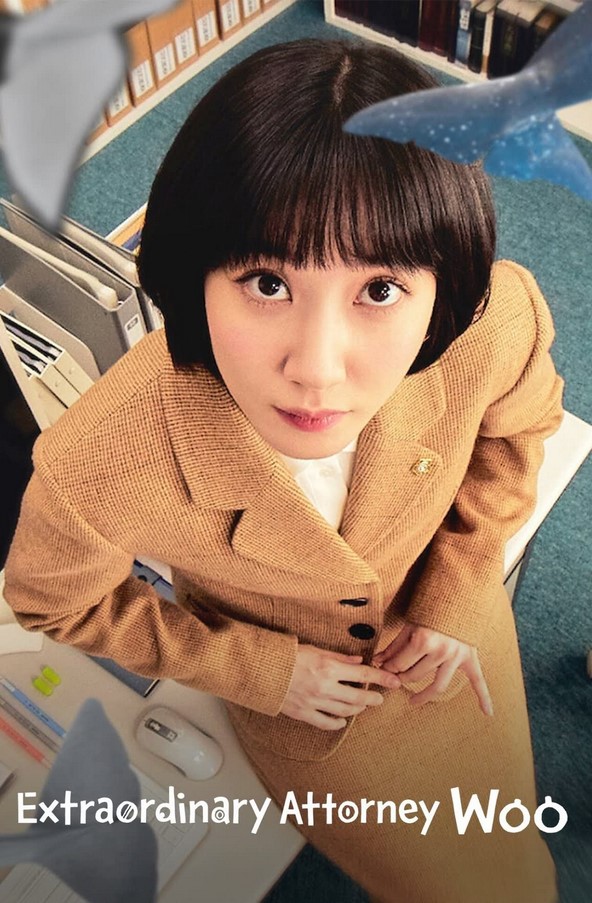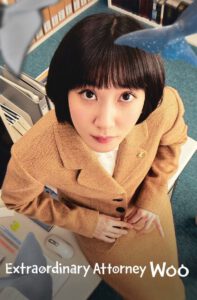Movie Info
Movie Info
- Director
- Yu In-sik
VP Content Ratings
- Violence
- 1/10
- Language
- 1/10
- Sex & Nudity
- 2/10
- Star Rating
Relevant Quotes
“You’re blessed when you’re content with just who you are—no more, no less. That’s the moment you find yourselves proud owners of everything that can’t be bought.
The new South Korean drama/comedy series Extraordinary Attorney Woo will lead to more binge watching, with its lead character even more handicapped than the wheel chair-bound lawyer Ironside, whose legal exploits thrilled its audience back in the late 60s and early 70s. 27-year-old attorney Woo Young Woo is indeed extraordinary in that she is Korea’s first lawyer with autism spectrum disorder (ASD), graduating from a prestigious law school at the top of her class, yet at first unable to secure employment because of her condition. As one who loves films about outsiders, I became totally won over within the first five minutes of the opening segment of this 16- part Netflix series!
Woo Young Woo (played by Park Eun-bin as an adult and Oh Ji-yul as a child) is probably the most different lead character to come along in years. She walks off kilter as if her legs and arms are only partial functional. She never looks a person in the eyes, and when she speaks, some of her words seem to have little relevancy. She is obsessed with whales and will quickly rattle off facts about them and their lives. And during introductions to new people she barely touches the outstretched hand of the other, usually spewing out what has become her verbal calling card, a series of words that like her name, are palindromes–“Kayak, deed, rotator, noon, racecar, Woo Young-woo.”
Each episode deals with a specific court case, and their range over a number of issues keep the series from settling into a monotonous sameness. I have thus far seen six, and murder is but one of many subjects dealt with. The unifying threads are Young-woo’s ASD, the response of others to her, and her obsession with whales that often inspires or offers clues to her for solving a legal problem. Equivalent to the old image of a light bulb in cartoons suggesting a bright idea is the moment when the lawyer’s hair starts to fly up and we see a whale, sometimes very close up—we know then that she has what is required to solve her case.
Episode 1 “Extraordinary Attorney Woo”
The rookie’s eidetic memory is on display in the first episode, a flashback to when she was 5-years-old who had never uttered a word out loud. But when she witnesses her father Woo Gwang-ho being assaulted by their neighbor’s jealous husband the little girl starts quoting the laws concerning assault that she has memorized from the books her father. All are surprised, both at her speaking and by the technical words she could not possibly understand. Left unexplained is why the father possesses law books, he being the manager of a gimbap restaurant.
In the present Young-woo is beginning her first day at the offices of the Hanbada law firm, one of Seoul’s most prestigious. But can she even get into the building, the revolving door seemingly insurmountable. Although this seems a bit exaggerated, akin to dozens of comic skits, it introduces us the character who seems destined to become our heroine’s love interest, Lee Jun-ho. He is not a lawyer but has an unspecified (thus far) position at the Hanbada firm, and the humor is continued in that once he has helped the hapless woman through the doors, the two get off the elevator on the same floor and enter the office before each realizes that the other has the same destination.
Senior attorney Jung Myung-seok does not want the novice rookie on his team, but his superior Han Seon-young insists on giving her a chance, though agreeing that if she fails him on this case. The case is that of an elderly woman accused of assaulting her husband, afflicted with headaches and bouts of dementia. The plan is to have her admit guilt in order to receive the minimum sentence, but Young-woo quickly points out that if she does so she will lose her pension and sink into poverty. The case becomes more severe when the old man dies, and Young-woo must figure out if it was from the wounds she inflicted, or could there be a prior cause.
Episode 2 “The Wedding Dress That Slipped Off”
In this story Woo Young-woo becomes involved in a suit against a posh hotel where bride Kim Hwa-young trips on her dress, pulling down the back to reveal she has a tattoo of the Buddha. Her humiliated father rejects the hotel’s refund and when the rival Taesan law firm turns him down because they deem his demand for compensation is too exorbitant, he comes to Hanbada. Our heroine figures that the gift of land the bride would have been given is large enough to justify his demand. She and Lee Jun-ho go undercover to the hotel where they uncover some interesting facts about the bridal dress. Also, when Young-hoo tries on a gown, Jun-ho sees her and is stricken with her beauty. However, the direction of the story changes when Kim Hwa-young’s unhappiness over the arranged wedding erupts, exposing to her Christian father that she is a Buddhist and also has a lover—and, well you can discover this easily enough.
Episode 3 “This is Pengsoo”
In this episode we encounter Kim Jeong-hoon, a young ASD man at the opposite end of the spectrum from Young-woo. He is accused of attacking his older brother, who dies intoxicated, his ribs mysteriously broken. Young-woo is assigned to the case because it is thought she could best communicate with a fellow ASD person. After receiving advice from her father about her own childhood communication break-through, she talks with Jeong-hoon through his love of Pengsoo, a popular penguin character on YouTube. She discovers that the brother had tried to hang himself, but the parents refuse to consider this.
In court the prosecutor uses Young-hoo’s functioning autism against the defendant. Despite her mentor’s objection, Young-woo is removed from the case. She becomes so despondent that she nearly hangs herself but is saved by Jun-ho. This leads her to realize what had actually happened between Jeong-hoon and his brother, the result that the charges are greatly reduced. Despite this, Young-ho acts in a drastic way that could change forever her life.
Episode 4 “The Strife of the Three Brothers”
A totally different kind of case is that of the father of Young-woo’s best friend Dong Geu-ra-mi, Dong Dong-sam. Having inherited from his father ₩10 billion, the malleable man gives in to the pressure of his two older brothers to give them the portion that Korean custom dictates, which would leave him with just 20% of the amount and also the payment of the taxes. This would leave him in debt. Unfortunately Dong-sam has signed the agreement papers. Young-woo has resigned from Hanbada because of her shame of being ASD, but still agrees to help because Dong Geu-ra-mi had befriended her in high school and defended her against bullies.
The knowledgeable lawyer concocts a scheme that involves her friend feigning drunkenness at her grandfather’s funeral and enticing her two cheating uncles into an act that will invalidate the agreement that Dong-sam had signed. The aftermath of the case is a reconciliation of the brothers. Also, Young-woo learns that her mentor Myung-seok has chosen not to process her resignation.
… … …
As viewers we are led to laugh one moment and then to cope with a tear-inducing incident the next. One of the most poignant scenes is in Episode 3 depicts Young-woo is talking quietly with her father and he shares honestly his feelings about raising her as a single parent. “Living with an autistic person is indeed quite lonely. It’s you and me against the world. But you, my daughter, don’t have any interest in me.” I’m not sure whether its here or in another scene that she confesses, “All my thoughts tend to center around me, so I make people close to me lonely. I don’t know when or why I do that. And I don’t know what I can do to stop it.”
I also loved the way in which Young-woo comes to accept herself as she is and not what she or society thinks she should be. She is in need of a Korean Fred Rogers saying to her, “I like you just the way you are.” And, indeed, she finds such persons—in Jun-ho, whose romantic feelings we will anticipate becoming more to the front; in her best friend from high school Dong Geu-ra-mi; in her mentor Han Seon-young who believes in her ability; and, as we will see in subsequent episodes, in fellow rookie Choi Su-yeon, who was a classmate at their law school and also works at Hanbada. And I love how the mind of senior attorney Jung Myung-seok, who had at first not wanted to work with her, changes as she proves time after time her ability at law.
I can hardly wait to write about the next four episodes—two of which I have already viewed. I am eager to find out why Young-woo’s father has raised her alone. What happened to her mother—there are a couple of hints given as to who she is. Why is he no longer a lawyer: it is fortunate that he did not get rid of his law books, else they would not have been there for his little daughter to read and memorize. And will Young-woo be able to reciprocate Jun-ho’s affections? Lots to look forward to—and I see that a second season has been negotiated!
What an incredibly engaging affair this nuanced series is, its cast totally engaged in telling stories that appeal to the mind as well as the heart. This is a series designed to change the jaded minds of those who, because of the sorry spectacle of lawyers in the news or in their sad experience, believe in the old Shakespeare maxim, “First, hang the lawyers.”
With each episode running a few minutes over an hour, this series in just the four episodes above raises plenty of issues for a group to discuss—the outsider, whether to accept, reject, or ignore? Family relationships, gay couples, religious tolerance, self-acceptance, and in Episode 5, corporate and legal ethics. Both the Torah and the teachings of Christ command us to respect and be concerned for the outsider—”You shall not wrong or oppress a resident alien, for you were aliens in the land of Egypt (Exodus 22:21, also 23:9); “When you beat your olive trees, do not strip what is left; it shall be for the alien, the orphan, and the widow.” (Deuteronomy 24:20). And, “Now all the tax collectors and sinners were coming near to listen to him. And the Pharisees and the scribes were grumbling and saying, “This fellow welcomes sinners and eats with them, So he told them this parable…” There follows the Parables of the Lost Sheep, the Lost Coin, the and the Lost Son and Waiting Father.
If you do decide to lead a study group, you will find a good synopsis of the 16 episodes by clicking on Wikipedia. But even if you do not, you will find yourself better informed about ASD people and smiling more at the world after watching each episode. I am so grateful for my friend and fellow film critic Sister Pacate for putting me on to this series. I am sure your friends will also be as glad when you share the series with them.
This review will be in the September issue of VP along with a set of questions for reflection and/or discussion. If you have found reviews on this site helpful, please consider purchasing a subscription or individual issue in The Store.


